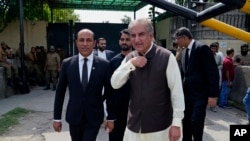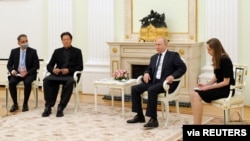The Islamabad High Court has overturned the conviction of former Pakistani Prime Minister Imran Khan and his foreign minister, Shah Mahmood Qureshi, in a case pertaining to mishandling state secrets.
In a short verbal statement witnessed by a VOA reporter Monday, two members of the high court announced the acquittals of Khan and Qureshi as it accepted their appeals against the convictions.
The decision in what is known as the “cipher case” comes after a special, lower court in January sentenced Khan and Qureshi to 10 years each in prison for making public the contents of a secret diplomatic cable sent by Pakistan’s then-ambassador to the United States.
The two men had argued the “sham case” was politically motivated and that the trial was conducted in an unfair manner.
Despite the high court’s order, Khan and Qureshi are not expected to walk free. Khan, imprisoned since last August, is serving time for a conviction for an illicit marriage.
Qureshi remains under arrest, facing a list of charges regarding violence that erupted in May of last year after Khan’s supporters stormed military and government installations to protest the former prime minister’s arrest.
Khan’s Pakistan Tehreek-e-Insaf, or PTI, hailed Monday's verdict. Congratulating supporters on the much-needed legal relief, party leader Syed Zulfikar Bukhari said in a post on X that the state’s “malafide attempt to establish IK [Imran Khan] and SMQ [Shah Mahmood Qureshi] as traitors goes into the dustbin.”
In a hastily called press conference, the government’s spokesperson for legal affairs, Aqeel Malik, said the prosecution might appeal the decision in the country’s top court.
“If the prosecution feels that there was an error [in the judgment] or it should be challenged, it will decide whether to appeal [the verdict] in the Supreme Court,” Malik said.
The court should have considered the national security implications of its decision, he added.
The cipher was not presented in the court at any stage.
Case history
In April 2022, Khan was expelled from power in a parliamentary vote of no-confidence. He had served fewer than four years of a five-year term.
Since then, Khan has alleged that a secret diplomatic cable, or cipher, proves that Washington conspired with Pakistan's military and then-opposition leaders to remove him from office. The cable was sent by Asad Majeed Khan, then-Pakistan's ambassador to the U.S.
State authorities alleged Khan and his allies used the document for political purposes and that the former prime minister did not return the decoded copy of the classified diplomatic message to the foreign office.
The special court, established under the Official Secrets Act, tried Khan and Qureshi in prison and sentenced both to a decade behind bars on January 30, before Pakistan held national elections February 8.
Cipher contents
In August 2023, American news outlet The Intercept published what it said was the text of the cipher.
The cable described a March 7, 2022 meeting between then-Ambassador Khan and Donald Lu, assistant secretary of state at the Bureau of South and Central Asian Affairs, in Washington.
According to the purported cable, State Department officials at the meeting encouraged the ambassador to tell Pakistan's powerful military that Islamabad could expect warmer relations if Khan were removed from office because of his neutrality on the Russian invasion of Ukraine. The Pakistani prime minister was in Moscow for talks with Russian President Vladimir Putin on Feb. 24, 2022, the day the invasion began, and did not condemn it.
"I think if the no-confidence vote against the Prime Minister succeeds, all will be forgiven in Washington because the Russia visit is being looked at as a decision by the Prime Minister. … Otherwise, I think it will be tough going ahead," the document quoted Lu as telling the Pakistani ambassador.
While the State Department has consistently rejected the allegation of orchestrating Khan's ouster, the department's spokesperson, Mathew Miller, conceded last year that the Biden administration was unhappy with Khan's overtures to Russia.
"We expressed concern privately to the government of Pakistan as we expressed concerns publicly about the visit of then-Prime Minister Khan to Moscow on the very day of Russia's invasion of Ukraine. We made that concern quite clear," Miller said at a regular press conference while responding to a question about The Intercept's reporting.
The Pakistani military and Khan's successors have also rejected his allegations.






